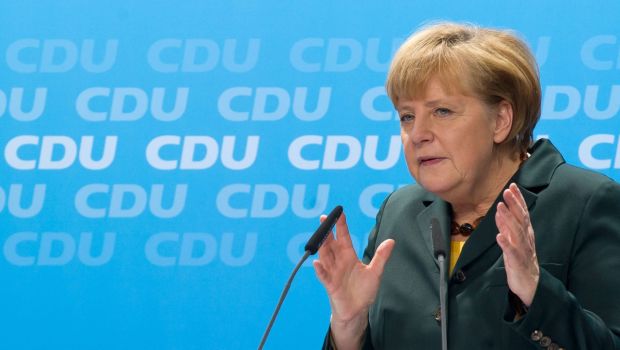
German Acting Chancellor Angela Merkel, chairwoman of Christian Democrats (CDU) party, delivers a speech to the CDU Federal Joint Committee (Bundesausschuss) in Berlin, Germany, on December 09 2013. (EPA/TIM BRAKEMEIER)
Merkel won September’s election but fell short of a majority and struck an agreement on November 27 for a “grand coalition” with the centre-left SPD. All 474,000 SPD members are now voting on it in a postal ballot whose results are expected this weekend.
“It’s taken us nearly three months to form a government and now it’s time to get to work,” Merkel told the 181 CDU delegates at a special party congress called to vote on the coalition deal. “I believe the compromises we’ve made are acceptable.”
Merkel could be sworn in for a third term on December 17 if the SPD—a distant second in September’s election—also backs the agreement. That is seen as increasingly likely even though the SPD’s youth wing urged members to vote “no” on Saturday.
The negotiations between Merkel’s conservatives and the SPD proved tortuous because the SPD was reluctant to join forces with Merkel again after seeing their support plunge in 2009 following the last “grand coalition”.
Courted by the CDU and their Christian Social Union (CSU) sister party, the SPD pushed through many of its campaign demands—including a minimum wage and costly changes to the pension system that the CDU’s youth and business wings opposed.
On Monday, Merkel nevertheless won near unanimous backing from the 181 delegates, with just two abstentions, after an unusually lively three-hour debate fuelled by criticism and grumbling from the conservative wing of Merkel’s party.
She defended the decision to accept a first-ever minimum wage in Germany, saying had been able to stagger its full introduction until 2017. She brushed off criticism about agreeing to lowering the retirement ages for some workers.
“The negotiations weren’t easy for us,” Merkel acknowledged in her speech, which was met by frosty silence at times. “The important thing is that I can say that with this agreement people in Germany will be better off in 2017 than they are now.”
Merkel said that she fought off SPD demands for higher taxes to finance spending for infrastructure and education.
She also admitted she would rather have continued ruling with the Free Democrats—or even forming a government with the Greens. But the FDP, her junior coalition partners, failed to clear the five percent of vote hurdle and were ejected from parliament. The Greens opted against pursuing coalition talks, she said.
Kurt Lauk, head of the CDU’s business wing, criticised the minimum wage which he said could lead to higher unemployment in parts of Germany. He also said the energy policies contained in the coalition deal would push up costs and jeopardize jobs.
“That’s not CDU policy,” he said.
The turbulence Merkel felt on Monday was mild compared with the resistance faced by SPD Chairman Sigmar Gabriel. On Saturday the Jusos, the SPD’s youth wing, voted against the coalition agreement despite his appeals for their support.
“This isn’t a marriage of love—it’s a coalition of reasonable prudence,” Gabriel told the Jusos, many of whom would prefer a coalition with the hardline Left Party and Greens to another term as junior partner to Merkel’s conservatives.
